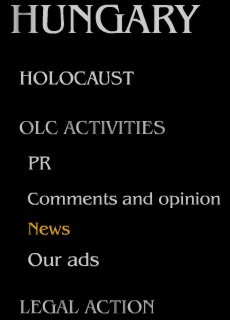| AUSTRALIA should be able to extradite a 90-year-old Perth man to Hungary over
Holocaust-related war crimes because his actions are likely
to have been illegal at the time, the High Court has been
told.
The full bench of the High Court sat in Canberra on Wednesday to hear an appeal
by the commonwealth on behalf of the federal minister for
home affairs regarding the case of Charles Zentai.
Mr Zentai is accused of murdering
an 18-year-old Jewish man in November 1944 while serving
in the Hungarian Army.
He denies the charge and allegations
that he beat the man to death before throwing his body into
the Danube River.
The federal government had approved
Mr Zentai's extradition to Hungary in November 2009, but
the decision was overturned on appeal in the Federal Court
last August.
The court ruled Mr Zentai could not
be extradited because the specific offence of "war crimes" did not exist in Hungarian law in 1944.
Hungary enacted laws in 1945 which
retrospectively introduced the war crimes offence.
On Wednesday the minister's counsel,
Stephen Lloyd SC, told the High Court that while the specific
offence did not exist in 1944, the alleged acts could be
charged as murder, which was an offence.
"If somebody asks for extradition
(when an offence is retrospective), then what we're required
to do before we can extradite is be satisfied that at the
time there was an offence," Mr Lloyd told the court.
He said Brendan O'Connor, who was
home affairs minister when the extradition order was issued,
had concluded along with his department that there was such
an offence.
"We asked them and they
said, yes, the offence was murder. Hungary have noted that
Zentai's conduct would have constituted murder," Mr Lloyd told the court.
He argued that was enough to satisfy
the treaty's requirements.
Mr Lloyd said that even if a person
had been convicted of war crimes in another country, Australia
would not extradite them if it was not satisfied there had
been an offence at the time of the action.
In response, Geoffrey Kennett SC told
the court that if the acts Mr Zentai allegedly committed
could be charged as murder under 1944 law then that was the
offence that should have been listed on the extradition treaty,
possibly
as well as war crimes.
He said the wording of the treaty
asked about the state of the law at the time an offence was
alleged to have occurred, not retrospective laws.
"It guards against a person
being ... sent overseas to be charged with an offence which
wasn't an offence at the time it was committed," Mr Kennett told the court.
Mr Zentai, who is on bail pending
the High Court decision, is also seeking to have the court
rule on whether the minister should have issued a statement
of reasons that explained his decision to agree to the extradition
order.
But Mr Lloyd said if the court did
rule on this, it could only order the reasons to be issued
(or not) - and not rule on the validity of the minister's
decision.
He told the court he believed Mr Zentai
was not after the reasons for the decision but rather wanted
the decision ruled invalid. heraldsun.com.au
|


